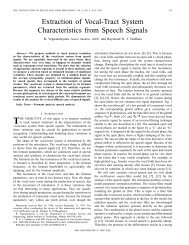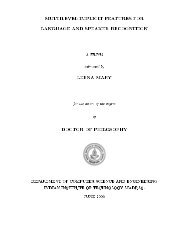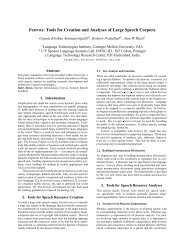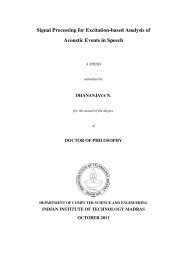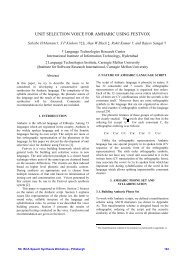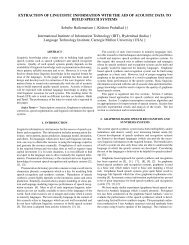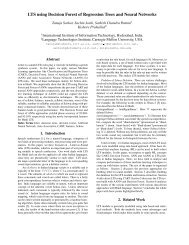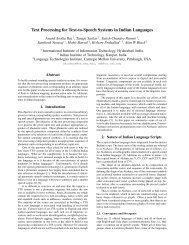word boundary- hypothesisation in hindi speech - Speech and ...
word boundary- hypothesisation in hindi speech - Speech and ...
word boundary- hypothesisation in hindi speech - Speech and ...
Create successful ePaper yourself
Turn your PDF publications into a flip-book with our unique Google optimized e-Paper software.
aapte7 3<br />
SIGNIFICANCE OF WORD BOUNDARIES IN LEXICAL ANALYSIS<br />
3.1 Introduction<br />
In the first chapter, arguments v:ere presented to justify the need fi3: pcrfcrm<strong>in</strong>g<br />
<strong>word</strong> <strong>boundary</strong> <strong>hypothesisation</strong> before perform<strong>in</strong>g lexical analysis. Three reasons were<br />
given <strong>in</strong> this regard: (i) improvement <strong>in</strong> the lexical match<strong>in</strong>g, (ii) easier h<strong>and</strong>l<strong>in</strong>g of<br />
unknown <strong>word</strong>s, <strong>and</strong> (iii) easy development of <strong>speech</strong>-to-text conversion systems.<br />
Reasons (ii) <strong>and</strong> (iii) are self evident. In this chapter, studies are reported establish<strong>in</strong>g<br />
(i), i.e., improvement <strong>in</strong> lexical analysis due to <strong>word</strong> <strong>boundary</strong> <strong>hypothesisation</strong>.<br />
There are two ways <strong>in</strong> which the <strong>word</strong> <strong>boundary</strong> <strong>hypothesisation</strong> can affect<br />
lexical analysis: (i) by reduc<strong>in</strong>g the number of alternate <strong>word</strong> str<strong>in</strong>gs for a given <strong>in</strong>put<br />
sentence, <strong>and</strong> (ii) by reduc<strong>in</strong>g the computation <strong>in</strong>volved <strong>in</strong> lexical match<strong>in</strong>g. While<br />
these two are related, their implications <strong>in</strong> the context of <strong>speech</strong>-to-text conversio~? are<br />
different. A reduction <strong>in</strong> the number of alternate <strong>word</strong> str<strong>in</strong>gs means a reduction <strong>in</strong> the<br />
computations for the later stages of process<strong>in</strong>g, such as syntactic <strong>and</strong> semantic analyses.<br />
On the other h<strong>and</strong>, a reduction <strong>in</strong> the lexical analysis time means a reduction <strong>in</strong> the<br />
total time for <strong>speech</strong> recognition. S<strong>in</strong>ce lexical analysis constitutes a major part of the<br />
<strong>speech</strong> recognition task, a reduction <strong>in</strong> the lexical analysis time can significantly speed<br />
up the overall recognition.<br />
In chapter 2 (section 2.2), two earlier studies on the effect of <strong>word</strong> boundaries<br />
on lexical analysis were described. These studies established that the knowledge of<br />
<strong>word</strong> boundaries (even if it is only partial) can improve the performance of the lexical<br />
analyser, especially when the <strong>in</strong>put is only partially known (midclass or broadclass<br />
str<strong>in</strong>gs) as likely <strong>in</strong> a <strong>speech</strong> recognition system. However these studies have not<br />
addressed the follow<strong>in</strong>g issues <strong>in</strong> detail:<br />
1. The effect of errors <strong>in</strong> <strong>in</strong>put symbols on the performance of a lexical analyser.



